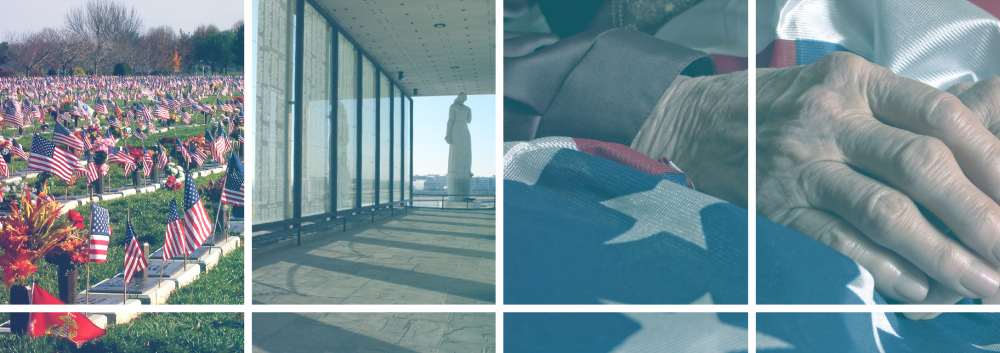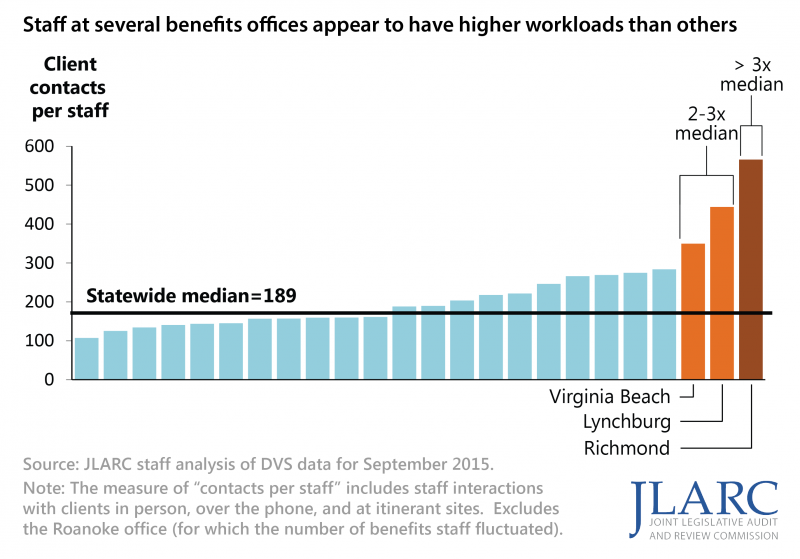Operation and Performance of the Department of Veterans Services

WHY WE DID THIS STUDY
In 2015 the General Assembly directed JLARC to review the Virginia Department of Veterans Services (DVS). The General Assembly’s mandate directed a broad review of the changing demographics and needs of Virginia’s veterans and the efficiency and effectiveness of DVS programs.
ABOUT VIRGINIA’S DEPARTMENT OF VETERANS SERVICES
DVS provides a variety of services to Virginia’s veterans. In addition to implementing several state programs for veterans, DVS is also responsible for connecting veterans to programs administered by other providers. DVS is the only agency in the Veterans and Defense Affairs secretariat and is governed by three different boards. The majority of DVS funding and staffing are devoted to running two veterans care centers. The centers are primarily operated using non-general funds. Most of the remaining DVS programs use primarily state general funds. These programs include benefits assistance and the Virginia Veteran and Family Support program.
WHAT WE FOUND
DVS is not strategically promoting awareness of its services
DVS’s mission statement cites timely transition assistance as a critical aspect of effective DVS operations. Although most DVS programs engage in some form of outreach, the quality of the outreach varies substantially and depends on the knowledge, experience, and initiative of individual staff members. This approach risks unclear and incorrect messaging to veterans and other potential customers, inefficient use of staff time, and veterans not being informed of valuable services that could benefit them.
Benefits assistance program has recently built a strong foundation upon which to continue improvement
Until recently, the benefits assistance program was poorly managed and under-resourced. Minimal training and oversight led to wide disparities in service quality among offices. Recent hiring of additional staff and staff training are among a variety of needed improvements made during the past year. The program recently began collecting client feedback, which has thus far has been positive.
The program can continue to build on these recent improvements. For example, some benefits offices could increase their use of a VA process that enables faster claims adjudication. There are also anecdotal reports of veterans facing long waits (or even being turned away) at certain higher workload benefits offices. Because the program does not track and monitor wait times, though, the magnitude of this problem is unknown.

VVFS program lacks clear role and directs staff to perform work they may not be sufficiently qualified to perform
The Virginia Veteran and Family Support (VVFS) program, which the General Assembly created to play a critical role in monitoring and coordinating mental health and rehabilitative services for veterans, faces a series of major program challenges. Effectively administering the VVFS program is imperative given the growing need for services among veterans—especially among post 9/11 veterans, many of whom return home struggling with post-traumatic stress disorder, traumatic brain injury, or major depression. Left unresolved, these challenges could lead to veterans not being correctly assessed or directed to inappropriate or low quality services.
The VVFS program is currently operating with a high degree of uncertainty about whether it is achieving its statutory objectives and how it should most effectively achieve these objectives. The program lacks the full range of useful performance measures, without which the effectiveness of the program is unknown. Additionally, staff have not received clear direction about how to do their jobs.
VVFS staff are providing some services they may not be qualified to perform. It is well established that case management for individuals with complex mental health conditions should only be provided by qualified case managers. There is some risk that individuals with mental health conditions who are served by unqualified or inadequately trained case managers will not be directed to the appropriate mental health services. There is evidence that current VVFS staff do provide case management services, although they may not be qualified to provide case management services under state regulations.
The challenges facing this program appear to be longstanding issues. The lack of clarity about the program’s role, staff expectations and qualifications, and gaps in policy guidance and key partnerships present some degree of risk to the health and safety of veterans receiving services and others.
WHAT WE RECOMMEND
Legislative action
- Direct DVS to monitor how long veterans wait at benefits assistance offices and how many veterans are turned away due to high workload, then use the information to balance staff workload across offices.
- Direct DBHDS to determine whether VVFS needs to comply with state case management standards and licensing requirements.
Executive action
- Convene a working group to develop a plan for the VVFS program to fulfill its statutory mandate.
Agency action
- Develop a detailed communications plan detailing specific strategies to ensure veterans are aware of DVS services.
- Develop sufficient policy guidance for VVFS staff to effectively implement the program.
The complete list of recommendations is available here.

